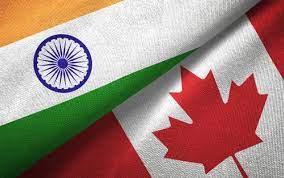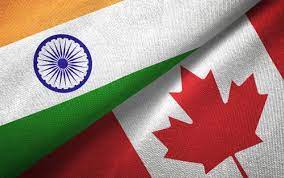
Canadian minister claims that there is a disagreement about study visas for Indian students.
According to a top Canadian official who spoke to Reuters, Canada issued significantly fewer study permits to Indian students in the latter part of last year as a result of India expelling Canadian diplomats who were responsible for processing the permits and a diplomatic spat over the death of a Sikh separatist leader in Canada.
In an interview, Immigration Minister Marc Miller stated that he thinks it is unlikely that the number of study permits issued to Indians will increase anytime soon. After Canadian Prime Minister Justin Trudeau claimed in June that there was evidence linking Indian government officials to the death of Hardeep Singh Nijjar in British Columbia, diplomatic tensions broke out.
According to Miller, the tensions will probably continue to affect the numbers in the future.
"Our relationship with India has really halved our ability to process a lot of applications from India," Miller said.
On directives from New Delhi, Canada was compelled to remove 41 diplomats, or two-thirds of its workforce, from India in October. Furthermore, a minister's spokesman stated that the disagreement has led Indian students to look at studying abroad.
According to official data that have not been previously released, these circumstances caused an 86% decrease in the number of study licences granted to Indians in the fourth quarter of last year compared to the previous quarter, from 108,940 to 14,910.
Indian international students were reportedly considering other possibilities outside of Canada because of "concerns, in the recent past, regarding lack of residential and adequate teaching facilities" at some Canadian universities, according to C. Gurusubramanian, counsellor for the High Commission of India in Ottawa.
Indians now make up the largest group of foreign students studying in Canada; in 2022, almost 41% of all permits, or 225,835 students, will go to Indians.
"I can't tell you about how the diplomatic relationship will evolve, particularly if police were to lay charges," Miller said. "It's not something that I see any light at the end of the tunnel on."
For Canadian universities, international students are a money maker, bringing in roughly C$22 billion ($16.4 billion) a year. A slowdown would be devastating to these establishments.
In June, Canada declared that "credible" claims had been made that Nijjar's death in a suburban Vancouver was the result of Indian spies. It is an accusation that India has denied. No one has been charged by Canadian police for the killing as of yet.
A 52-year-old man who had collaborated with an Indian government official was accused by the U.S. Justice Department last year of planning to kill a supporter of a Sikh sovereign state in northern India who lived in New York City.
In part as a response to the persistent housing constraint, the Canadian government has also been working to lower the total number of foreign students coming to the nation.
Miller remarked, "Right now we have a challenge with the sheer volume" of kids arriving. "It's just gotten out of control and needs to be reduced - I would say - significantly over a short period of time."
Miller stated that additional steps, maybe including a cap, would be implemented by the government to reduce the number of foreign students during the first half of this year.
Because obtaining a work permit after completing courses is very simple, Canada is a popular location for overseas students.
He stated that in addition to addressing "a very generous" programme for postgraduate work permits, the government plans to take tough measures against "fly-by-night" universities, also known as designated learning institutes.
The food service and retail sectors are concerned that the government's proposals to limit the amount of time foreign students can work off-campus could result in a labour shortage.
The government estimated that 900,000 foreign students would study in Canada in 2024—roughly three times as many as there were ten years prior. Miller said that 360,000 students, or 40% of the total, were Indian. Although they still made up the largest group, Indian students received 4% fewer visas last year.
(Source:www.theprint.in)
According to a top Canadian official who spoke to Reuters, Canada issued significantly fewer study permits to Indian students in the latter part of last year as a result of India expelling Canadian diplomats who were responsible for processing the permits and a diplomatic spat over the death of a Sikh separatist leader in Canada.
In an interview, Immigration Minister Marc Miller stated that he thinks it is unlikely that the number of study permits issued to Indians will increase anytime soon. After Canadian Prime Minister Justin Trudeau claimed in June that there was evidence linking Indian government officials to the death of Hardeep Singh Nijjar in British Columbia, diplomatic tensions broke out.
According to Miller, the tensions will probably continue to affect the numbers in the future.
"Our relationship with India has really halved our ability to process a lot of applications from India," Miller said.
On directives from New Delhi, Canada was compelled to remove 41 diplomats, or two-thirds of its workforce, from India in October. Furthermore, a minister's spokesman stated that the disagreement has led Indian students to look at studying abroad.
According to official data that have not been previously released, these circumstances caused an 86% decrease in the number of study licences granted to Indians in the fourth quarter of last year compared to the previous quarter, from 108,940 to 14,910.
Indian international students were reportedly considering other possibilities outside of Canada because of "concerns, in the recent past, regarding lack of residential and adequate teaching facilities" at some Canadian universities, according to C. Gurusubramanian, counsellor for the High Commission of India in Ottawa.
Indians now make up the largest group of foreign students studying in Canada; in 2022, almost 41% of all permits, or 225,835 students, will go to Indians.
"I can't tell you about how the diplomatic relationship will evolve, particularly if police were to lay charges," Miller said. "It's not something that I see any light at the end of the tunnel on."
For Canadian universities, international students are a money maker, bringing in roughly C$22 billion ($16.4 billion) a year. A slowdown would be devastating to these establishments.
In June, Canada declared that "credible" claims had been made that Nijjar's death in a suburban Vancouver was the result of Indian spies. It is an accusation that India has denied. No one has been charged by Canadian police for the killing as of yet.
A 52-year-old man who had collaborated with an Indian government official was accused by the U.S. Justice Department last year of planning to kill a supporter of a Sikh sovereign state in northern India who lived in New York City.
In part as a response to the persistent housing constraint, the Canadian government has also been working to lower the total number of foreign students coming to the nation.
Miller remarked, "Right now we have a challenge with the sheer volume" of kids arriving. "It's just gotten out of control and needs to be reduced - I would say - significantly over a short period of time."
Miller stated that additional steps, maybe including a cap, would be implemented by the government to reduce the number of foreign students during the first half of this year.
Because obtaining a work permit after completing courses is very simple, Canada is a popular location for overseas students.
He stated that in addition to addressing "a very generous" programme for postgraduate work permits, the government plans to take tough measures against "fly-by-night" universities, also known as designated learning institutes.
The food service and retail sectors are concerned that the government's proposals to limit the amount of time foreign students can work off-campus could result in a labour shortage.
The government estimated that 900,000 foreign students would study in Canada in 2024—roughly three times as many as there were ten years prior. Miller said that 360,000 students, or 40% of the total, were Indian. Although they still made up the largest group, Indian students received 4% fewer visas last year.
(Source:www.theprint.in)














